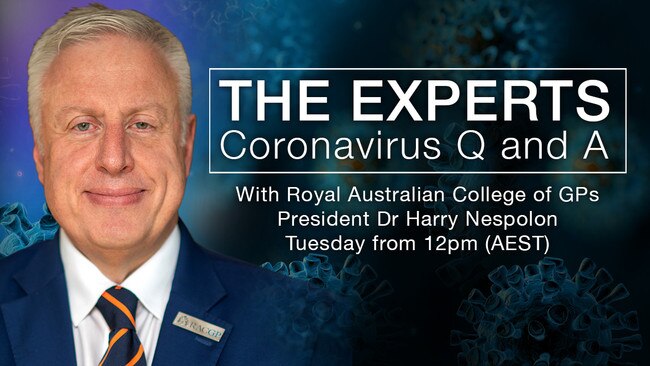Dr Harry Nespolon answers your health questions
Dr Harry Nespolon answers your questions on the risks from smokers, the supposed malaria drug cure and whether we all just need some time in the sun.

- How to maintain strong relationships in pandemic
- Woolies boss rolls out facts on toilet paper trail
- Why one financial lifeline is no super solution
Weeks into the coronavirus crisis, Australians are still seeking answers on how to safeguard the health of their families and themselves.
The pandemic is also raising other health concerns, with reports GP clinics have seen a drop in general patient numbers as people stay away because of COVID-19.
Today Royal Australian College of GPs President Dr Harry Nespolon answered your questions in an online Q&A.
Here’s what he had to say:
Q. My husband and I are 55 and 59 and are wondering if it is prudent to get the flu shot at this time. After getting it last year we both suffered with flu-like symptoms for a couple of weeks afterwards. What if the same thing happens this year and we’re also struck down with COVID-19? Should we wait?
A. The number of side effects from the influenza vaccination is very small. If you do develop flu-like symptoms after your vaccination they usually last for about 24 hours. If your symptoms lasted for several weeks you would usually consider some other cause.
Your ages do not put you in a high risk group for influenza. If you have other medical problems this could put you in at high risk.
You should consider having your influenza vaccination this year, as it will help protect you from the influenza as well as your family and friends, and it will help our hospitals if you don’t develop a complication from pneumonia.
It is possible to have both a COVID-19 and influenza infection at the same time.
I would suggest you get it influenza vaccination done now, while there is low community spread of the COVID-19 virus.
Q. If a smoker has the virus and blows smoke onto your face can you catch the virus?
A. Yes you can. The smoker is at greater risk of catching the virus in the first place. Blowing smoke means that you could be spraying droplets or aerosol into the air.
Q. I have heard that the malaria drug can kill the coronavirus. What do you know about this?
A. Hydroxychloroquine theoretically can kill the coronavirus. This was based on a very small and poorly designed French study of 20 patients. Then there are anecdotal advocates. One of the problems with testing any medication when it comes to COVID-19 is that 80 per cent of people recover without any medication. So just because you have taken the medication you don’t know whether it is the effect of the medication or the patient was going to get better anyway.
There are a number of studies being conducted to see whether this really does work. None of these have reported yet.
As of today the only activities that have shown to work is physical distancing and the other viral transmission minimising activities.
Q. Why is there such a hush-hush over hydroxychloroquine?
A. I don’t think that there is any hush-hush over hydroxychloroquine. I don’t think that there has been a week that has gone by where the President of the USA has not promoted it.
As of today (as against tomorrow) there are no reputable studies to show that the hydroxychloroquine is a treatment (let alone a preventer) for the SARS-CoV-2 virus.
There are side effects including serious side-effects associated with all medications. So there is a balance between the risk of a significant side effect with the possible benefit.
Q. What are surgeries doing now about everyday appointments. Are GPs still seeing people in person and if not how does telehealth work – do I still book an appointment through the surgery as normal? Can the doc treat me properly if they can’t actually examine me?
A. As GPs we are trying to remind people that they do need to take care of themselves beyond COVID-19. General practices are open and will see you depending on what your medical problem is. Most practices are screening patients when they ring to check whether they might be at risk of COVID-19 and doing those consultations as telephone/telehealth consultations. For other medical problems they might be suitable for telephone/telehealth consultations however there will be still many problems that require for you to be seen.
At the moment for example, you might be considering influenza vaccination which will require you to go to the general practice.
I would suggest that you ring you your practice and they will discuss the best way to deliver the care that you need.
Q. Since a person can have coronavirus and not show any symptoms. How is such a situation managed? Can people who think they have it go and get tested?
A. There are two situations – firstly if you do get infected you are asymptomatically spreading the virus for about 24 hours until you develop symptoms. The other situation is where the symptoms are very mild and the person does not realise that they are infected.
This is where testing becomes very important. Up until recently there was a shortage of testing kits. As we move to the next phase testing of asymptomatic people will become very important in limiting the spread of the virus. Currently that is being done in ‘hot spots’.
Q. Is it true that being out in the sunshine will kill the virus? From what I’ve researched, UV rays will have an effect but only if it’s over 50 degrees and it depends on the length of exposure to the UV rays.
A. UV treatment in a clinical sterilisation situation can destroy the virus. Sunshine of itself will not.
You can see more questions and responses in the comments below.
